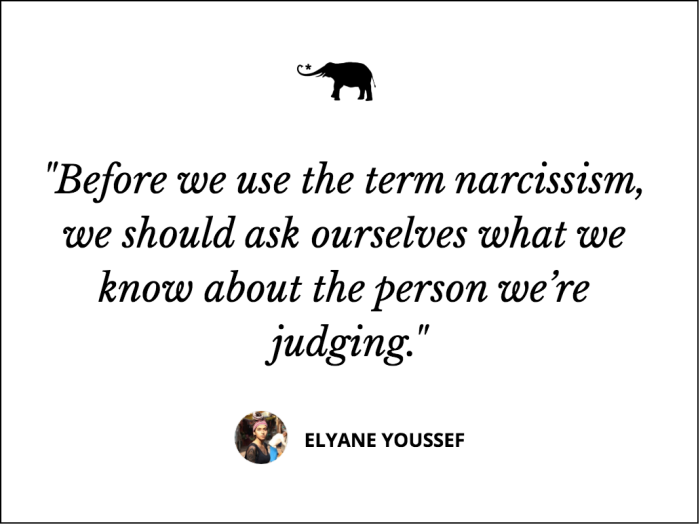It could be just me, but hearing people talking about other people being narcissists is making me cringe.
Over the past few years we’ve all heard this label being thrown around randomly, justifying any behavior that might be difficult, “toxic,” or self-absorbed.
Without much thought—or knowledge—we label someone with a difficult personality a narcissist, disregarding the fact that narcissism is a serious mental condition that can only be diagnosed by a clinician.
Your wife could be insensitive. Your boss might be a jerk. Your neighbor is a total asshole. But are they really “narcissists?”
Maybe not.
Here are six reasons we need to stop calling other people narcissists:
1. We overlook our own problems by calling others narcissists. Many moons ago, I was in a rough relationship that brought me to my knees for many years. Long after I ended the relationship, I still labeled the guy a narcissist who had only cared about himself.
Looking back now, I have no freaking idea if he truly was one (I’m no therapist, right?). But I do know that we weren’t a good match and that I, too, was suffering from my own mental issues. I had zero self-worth, I suffered from fear of abandonment, and I drew zero boundaries whatsoever, which brings me to this question: was he the one who was a “narcissist” or was I the one who failed to leave, let alone change my bad situation?
But back then, calling him a narcissist brought me comfort. Being stuck in a narrative with a villain made me the victim and my ego kinda enjoyed it—trust me. That said, when we “name” the source of our pain, we feel liberated, reasonable, and as if nothing is wrong with us. So let’s stop calling people narcissists because we are most probably overlooking our own problems and taking the easy way out.
2. We put them in a tiny, tiny box. Many years after my dismal breakup, that guy entered a healthy relationship with someone who was a great fit for him. “Hmm, are you saying that people change?” you might ask. Yes, of course!
When I labeled him a narcissist, that was my own perspective. That was my own story. It’s not true that we have a fixed personality that never changes. I think parts of our personality constantly fluctuate depending on the people we meet and are in a relationship with. Perhaps that guy exhibited narcissistic behaviors only with me because I, in turn, might have exhibited traits of inferiority and weakness.
Even research suggests that our personality is not fixed; it evolves throughout our lives. So when we refer to someone as a narcissist, we’re actually putting them in a box—which is extremely limiting and shallow.
3. We disregard their past and upbringing. Before we use the term narcissism, we should ask ourselves what we know about the person we’re judging. What do we know about their childhood? What do we know about the relationship they have/had with their parents? What about the traumatic events they never talk about or the childhood wounds they don’t even know exist?
When someone displays difficult or “narcissistic” behaviors, there’s a viable reason. And most times, we don’t know what that reason is. Maybe the person we’re calling a narcissist might be giving themselves the validation they had never received as children. Maybe they were treated poorly. Maybe they were bullied.
Maybe the narcissistic behaviors they are displaying are all they have ever known.
4. We discount their inherent goodness. If you think “narcissists” are jerks, well, we’re all jerks in our own way. In fact, we are all part jerk and part sweet. I personally wouldn’t like it if someone talked about my “part jerk,” completely disregarding my “part sweet.”
As I mentioned earlier, there’s a reason for difficult behaviors. But difficult behaviors don’t make someone devoid of emotion. We all have good traits, and “narcissists” can be extremely caring humans. You might be focusing on one side only.
5. We’re missing the point. After many failed relationships and friendships in my life, I have realized that there isn’t a “bad person.” There’s a bad situation. But we always get that wrong. We miss the point when we blame other people without actually trying to change or fix the situation we’re in.
Consequently, having certain traits is not the main issue here. Being selfish, a “narcissist,” possessive, controlling, or needy is not the problem here. We all have bad traits. I can be extremely paranoid at times—and needy—but that doesn’t make me a bad person. After all, no one’s perfect!
The real problem and the real deal-breaker is the type of relationship we have with someone—not who they are. Personal traits are not fixed. We are constantly changing and evolving depending on the circumstances and obstacles around us. But situations can be fixed and they can last for a long time.
That said, has the relationship always been abusive? Is your situation bad? Now that’s a problem—but we can do something about it. We can leave, we can draw better limits, and we can protect ourselves.
6. Because we are all narcissists to some degree. Yup, we’re all part of this human condition. We all have ego. We all suffer from ego. And we’re all trying to heal our ego.
~










Read 14 comments and reply